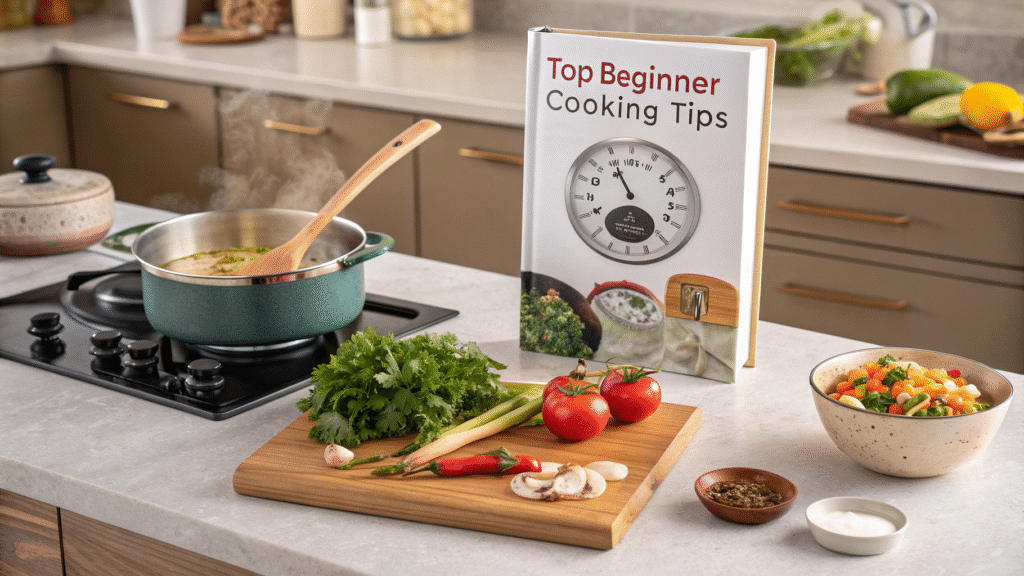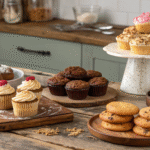Introduction
We’ve all been there. You’re standing in front of the stove, trying to follow a recipe, and suddenly the smell hits — something’s burning. Maybe it’s the onions that turned black, the chicken that stuck to the pan, or the rice that’s now part of the pot. If you’ve ever felt this panic, you’re not alone.
But here’s the good news: Cooking isn’t about perfection; it’s about progress. And with just a few smart tips, you can avoid the most common kitchen disasters, especially burning your food. This article is your no-nonsense guide to beginner cooking tips that will save your meals, your confidence, and your pans.
Let’s dive in and learn the tricks that experienced cooks know — the ones you’ll wish someone had told you sooner.
1. Always Preheat Your Pan (But Not Too Hot!)
One of the biggest mistakes new cooks make is tossing food into a cold or overheating pan.
Why It Matters:
- A properly preheated pan ensures even cooking.
- Too hot, and you’ll burn the outside before the inside cooks.
Pro Tip: Add a drop of water to the pan. If it sizzles and evaporates quickly, it’s ready.
2. Control the Heat
Medium heat is your friend. High heat is tempting but dangerous unless you’re searing meat.
Why It Matters:
- Cooking too hot leads to burning.
- Lower, consistent heat gives you more control.
Pro Tip: If something’s cooking too fast, don’t be afraid to turn down the burner.
3. Use the Right Oil for the Job
Not all oils are created equal. Some can handle heat better than others.
Best Oils for High Heat:
- Canola, vegetable, peanut oil
Best for Low-Medium Heat or Finishing:
- Olive oil, butter
Pro Tip: Butter burns quickly — mix it with oil to prevent this.
4. Don’t Walk Away
Multitasking while cooking is a recipe for disaster.
Why It Matters:
- Even a few extra seconds can lead to burning, especially with garlic, onions, and eggs.
Pro Tip: Stay present. Use timers, and if you must walk away, reduce the heat.
5. Prep Everything First (Mise en Place)
The French call it “mise en place,” or “everything in its place.”
Why It Matters:
- Prepping all your ingredients keeps you from scrambling and burning while looking for things.
Pro Tip: Chop, measure, and arrange all ingredients before the stove comes on.
6. Don’t Overcrowd the Pan
Want crispy potatoes or browned meat? Give them space!
Why It Matters:
- Crowding traps steam, leading to soggy or uneven cooking.
- Food won’t brown properly and may burn in some spots.
Pro Tip: Cook in batches if necessary.
7. Learn to Use a Lid
Lids can save your food — or ruin it.
Why It Matters:
- Use a lid to trap moisture for rice, pasta, or simmering.
- Leave it off when searing or reducing a sauce.
Pro Tip: A see-through lid helps you monitor without lifting and releasing heat.
8. Taste As You Go
You can’t fix a burnt steak, but you can avoid a bland one.
Why It Matters:
- Tasting lets you adjust salt, spices, and acid before it’s too late.
Pro Tip: Keep a spoon handy and sample every few steps.
9. Know When to Stir (And When Not To)
Stirring too often can mess up your food. So can not stirring enough.
Why It Matters:
- Stir sautés occasionally to prevent sticking.
- Let meat and pancakes sear without touching so they release easily.
Pro Tip: Wait until the food naturally lifts off the pan before flipping.
10. Clean as You Cook
Burnt food often results from a cluttered, messy workspace.
Why It Matters:
- Staying organized reduces distractions and accidents.
Pro Tip: Use cooking downtime to rinse dishes or wipe counters.
11. Use a Timer (Always)
Your memory isn’t as reliable as you think.
Why It Matters:
- Timers keep you focused and help avoid overcooking.
Pro Tip: Set timers even for boiling eggs, simmering sauces, or toasting bread.
12. Know When It’s Done
Cooking meat or baking? Don’t just guess.
Why It Matters:
- Undercooked is unsafe, overcooked is dry and burnt.
Pro Tip: Use a meat thermometer and look for visual cues (golden crust, bubbling sauce, firm texture).
Frequently Asked Questions (FAQ)
Q1: What do I do if I burn something?
A: Don’t panic. Remove the food from the heat immediately. If it’s just the bottom, transfer the rest to a new pan.
Q2: How do I stop things from sticking to the pan?
A: Preheat the pan, use enough oil, and don’t flip too soon. Let the food sear and release naturally.
Q3: Why does my garlic always burn?
A: Garlic cooks quickly. Add it after onions and only cook for 30 seconds. Stir constantly and keep the heat low.
Q4: What should I start cooking as a beginner?
A: Try pasta, stir-fries, scrambled eggs, and one-pot meals. They’re forgiving and help you build confidence.
Q5: Is nonstick cookware better for beginners?
A: Yes, it helps reduce sticking and burning. Just avoid using metal utensils and keep the heat medium or lower.
Conclusion
Cooking is a skill, not a mystery. The burnt toast, the blackened onions, the scorched pan — they’re all rites of passage. But with these top beginner tips, you’ll avoid the most common pitfalls and gain confidence with every meal.
Remember, the goal isn’t perfection. It’s progress. Every time you cook, you’re learning. And now, you’re equipped with tools to make that learning faster and a whole lot less smoky.
So, the next time you hear the sizzle, you’ll smile instead of panic. Because now you know how to control it.


